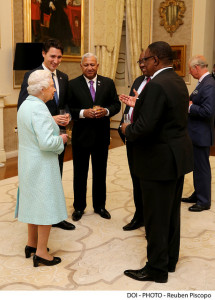by Dr Eva Namusoke, Postdoctoral Research Officer, Institute of Commonwealth Studies
One of the traditions at Commonwealth Heads of Government Meetings is for the Queen to host a luncheon for new leaders of member states. Those present at the November 2015 luncheon in Malta included the Prime Minister of Canada, Justin Trudeau who had taken office on the 4th November 2015, President Muhammadu Buhari of Nigeria who had been sworn in on 29th May 2015, and Fiji’s Prime Minister Josaia Voreqe ‘Frank’Bainimarama who has been in this position since 22nd September 2014. Despite his latest post, Bainimarama has been a well-known figure in Commonwealth affairs for well over a decade. In fact, the 2015 CHOGM marked Fiji’s full return to the Commonwealth after a suspension that began on 8th December 2006 following a bloodless military coup instigated by then Commodore Bainimarama. When Fiji had failed to restore democracy by 2009, the suspension was extended, prohibiting Fiji from participating in any Commonwealth events or activities. Following a partial lift in March 2014, the suspension was fully lifted on the 24th September 2014 after democratic elections earlier that month.

Prime Minister Frank Bainimarama – centre – with the Queen and new Commonwealth leaders. CHOGM Malta 2015 photo by Reuben Piscopo
The 2006 suspension was not the first for Fiji, after a ten year suspension began in October 1987 following two coups d’etat and another 6 month partial suspension by the Commonwealth Ministerial Action Group (CMAG) in 2000. Former Ambassador and Foreign Minister of Fiji Kaliopate Tavola was heavily involved in Fijian politics from the 1970s. In his interview he discussed in detail all of the coups, Fiji’s suspensions and interaction with the CMAG, and the Fijian peoples’ appreciation for the Queen: ‘Well, you know, when [Sitiveni] Rabuka declared a republic [in 1987], that was not a popular declaration. Pictures of the Queen in many Fijian homes didn’t come down and they are still there.’
As noted by Tavola, military leader and former Prime Minster of Fiji Sitiveni Rabuka(1992-1999) was personally involved in the 1987 coups. In his interview Rabuka recounted his alleged conversations with then Prime Minister Ratu Mara right before the second 1987 coup, the relationship with the Realm and Commonwealth in this period, and an anecdote about the conversation he had with the Queen concerning re-establishing the British monarchy in Fiji.
Other individuals who discussed Fiji’s political history in the Commonwealth include Sir Anand Satyanand who hosted failed peace talks in 2006 between Commodore Bainimarama and Prime Minister Laisenia Qarase; Hugh Craft, the Director of the International Affairs Division at the Commonwealth Secretariat from 1979-1988 and former Secretary General Sir Don McKinnon (2000-2008). Michael Frendo of Malta who was Chair of the CMAG from 2005-2007 offered an insight into how the CMAG and Secretariat approached Fiji’s suspension in 2006.
When read together, these interviews reveal the many ways in which the Commonwealth has been engaged with Fijian politics over the past thirty years, including the diplomacy and personal sensitivity required to deal with figures such as Bainimarama and Ratu Mara. That Bainimarama is seen in the photograph above sharing a cordial drink with the Queen after decades of coups and political uncertainty in his home country suggests that the Commonwealth is an organisation where – under the watchful gaze of a number of Commonwealth bodies and with a solid democratic process in place – ones past can be forgiven.
